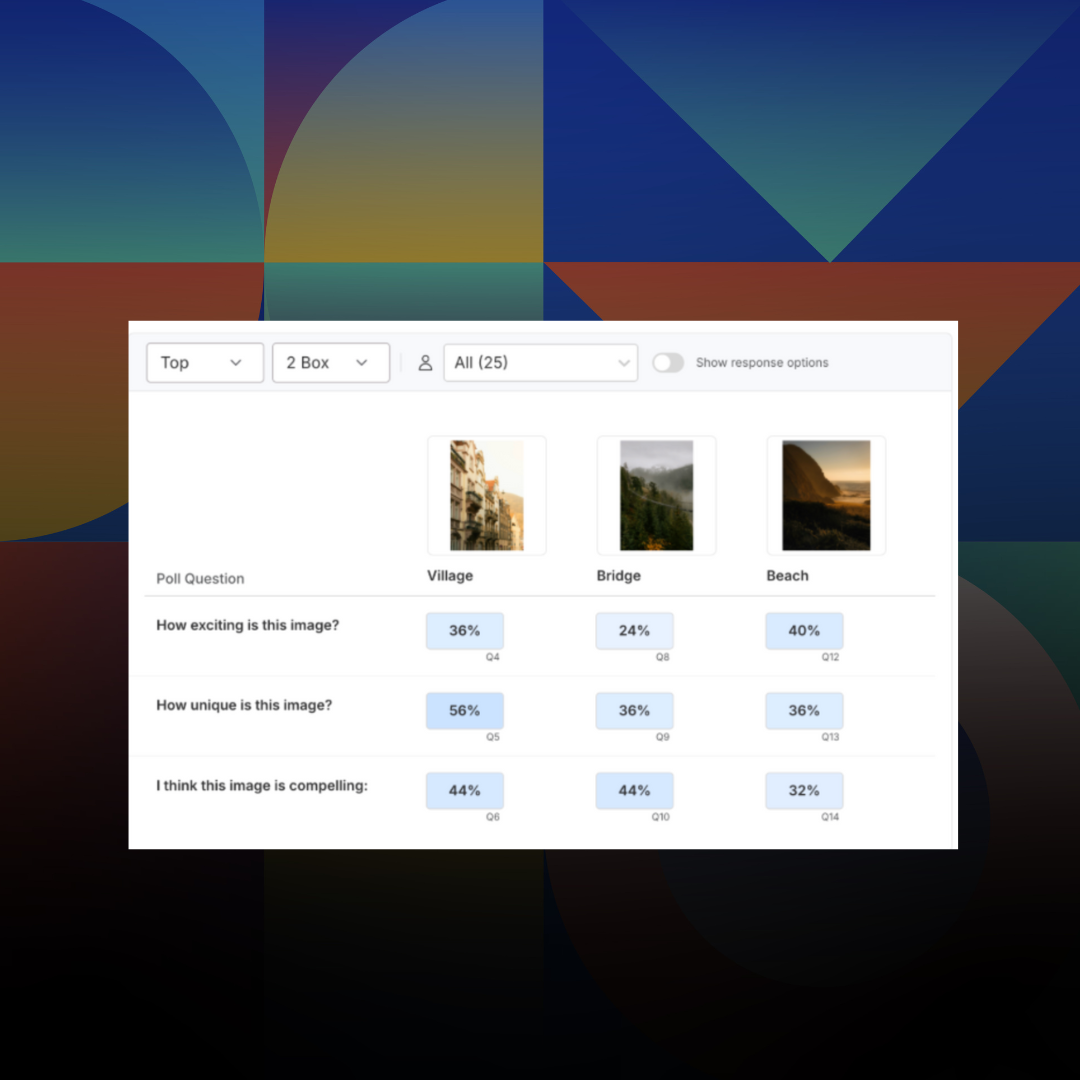.jpg)
Advanced Research
9 Essential Questions for Evaluating Employee Satisfaction Software
February 20, 2026
Employee Research
Articles
.jpg)
Advanced Research
9 Essential Questions for Evaluating Employee Satisfaction Software
February 20, 2026
Employee Research
Articles

Advanced Research
How to Evaluate Market Research Vendors for Global Reach
Team Remesh
February 10, 2026
Market Research
Articles

Advanced Research
How to Evaluate Market Research Vendors for Global Reach
Team Remesh
February 10, 2026
Market Research
Articles

Advanced Research
3 Early-Stage Research Methods to Gather Consumer Insights
Team Remesh
January 27, 2026
Market Research
Articles

Advanced Research
3 Early-Stage Research Methods to Gather Consumer Insights
Team Remesh
January 27, 2026
Market Research
Articles
.avif)
Advanced Research
Why Agencies Should Embrace AI Tools for Market Research
Team Remesh
January 26, 2026
Articles
.avif)
Advanced Research
Why Agencies Should Embrace AI Tools for Market Research
Team Remesh
January 26, 2026
Articles

Advanced Research
The Top Market Research Companies for the CPG Industry
Team Remesh
January 20, 2026
Market Research
Articles

Advanced Research
The Top Market Research Companies for the CPG Industry
Team Remesh
January 20, 2026
Market Research
Articles

Advanced Research
The Most Cutting-Edge Consumer Insights Software of 2026
Team Remesh
January 5, 2026
Market Research
Articles

Advanced Research
The Most Cutting-Edge Consumer Insights Software of 2026
Team Remesh
January 5, 2026
Market Research
Articles

Research 101
Introducing: Poll Comparison - Streamline Concept Testing and Make Better Decisions Faster
Emmet Hennessy
November 24, 2025
Market Research
Articles

Research 101
Introducing: Poll Comparison - Streamline Concept Testing and Make Better Decisions Faster
Emmet Hennessy
November 24, 2025
Market Research
Articles

AI
Purpose-Built for Research AI is Here - a Letter from the CPO
Jessica Dubin
October 21, 2025
Market Research
Articles

AI
Purpose-Built for Research AI is Here - a Letter from the CPO
Jessica Dubin
October 21, 2025
Market Research
Articles

Advanced Research
Unlock Agile Global Insights: Using Remesh Multi-Language Conversations for Research Across Audiences
Customer Success Team
October 14, 2025
Market Research
Articles

Advanced Research
Unlock Agile Global Insights: Using Remesh Multi-Language Conversations for Research Across Audiences
Customer Success Team
October 14, 2025
Market Research
Articles
Building a Vibrant Company Culture with Employee Engagement Tools
Company culture is a mixture of many different things- employee values, personality, work environment- how do you help your culture to grow organically with employee engagement tools?



Employee engagement initiatives aren’t always easy, but when done right, it can be incredibly valuable for employees and organizations alike. Globally on average, 65% of employees are thinking about changing companies and 54% feel low energy and enthusiasm in their work, according to a Gartner study. While dire, these numbers aren’t the most surprising in today’s work-driven culture. The problem is, measuring employee engagement and pinpointing the root of issues isn’t a simple task.
The Importance of Engaged Employees
Understanding engagement is an important yet complex challenge in itself. Over recent years, there has been a significant shift in engagement and the impact it has had on the workforce. People are questioning their happiness at work and more often looking for roles at companies that more closely align with their values, beliefs, and career goals. If they aren’t engaged and actively connected to their work, they will look elsewhere.
Inevitably, being engaged at work means something different to each employee, but the result of an engaged employees is the same: they are more likely to stay with an organization, perform better and act as advocates of the business. Companies need to have an engagement model that accommodates the voices and needs of a multigenerational and multicultural workforce.
The State of Employee Engagement in 2018
Employee surveys have been with us since the 1930s, and are still the go-to method for evaluating perspectives. Today’s low engagement levels, however, show that surveys aren’t enough anymore. A recent report from Remesh revealed that only 44% of HR professionals agree that employees in their organization gives their best effort, suggesting most organizations need substantial help in this area.
Typically, managers say that employees do not leave jobs, they leave bosses-but that only scratches the surface. Employees leave companies for multiple reasons when they don’t feel engaged: sometimes they have an environment where they can’t thrive or aren't heard and sometimes they don’t like the leadership’s direction. Either way, companies need to assess, address and improve the rift in why employees stop feeling invested in their work or the company.
AI Impacting the Future of Employee Engagement
Engagement is an ever-evolving, living element and impacts all facets of the employee / employer relationship. In truth, annual surveys and focus groups often do not align with the real world because what an employee feels in a survey doesn’t fully reflect the nuanced daily ups and downs they experience. The deepest and most transformative insights happen when companies frequently connect with large groups of employees to ensure constant feedback loops are developed. Further segmentation is required to reveal what drives these opinions, motivations and behaviors.
Luckily, advancements in technology are allowing HR professionals to collect and identify meaningful insights from employees to get to the root of problems faster. Typical surveys can be too rigid of a way to collect feedback from employees, while engaging all your employees at once would also be an overwhelming and not very practical experience. Instead, new software allows employers to use digital platforms to engage all of their employees at once, while giving employees the opportunity to share honest, open-ended feedback in real-time. The advancement of artificial intelligence and machine learning now lets employers make use of this data much faster- highlighting responses that best represent your employees, and uncovering popular opinions and topics that matter most to your employees as a whole. This way, employers can better understand employees outside of the traditional fixed responses and can pinpoint issues or challenges that may have flown under the radar. Given that a large and diverse group of people will have many divergent opinions and multiple intelligent thoughts, technology can enable organizations to slice and segment different demographic or psychographic groups to provide a deeper truth of what’s going on with employees.
At Remesh, we use our own platform internally every Friday to address work challenges, discuss alternatives to our current processes, and open the floor to concerns, questions, and thoughts about what we will encounter as we continue to scale. While the technology helps surface the issues we care about the most as a company, sometimes it’s the act of engaging each and every person, and giving them an equal opportunity to voice their thoughts, that can best cultivate a happy, transparent, and strong culture.
Businesses building for the future should prioritize implementing advancements in technology, like AI, to provide engagement models that accommodate the voices and needs of their employees. Successful companies will give their employees a real platform for voicing their opinions, concerns, and feedback, and then act on the data they collect to make impactful changes in their organization. Then you’ll be able to build something true, together.
Want to learn more about employee engagement and what other companies are doing to boost engagement? Download our free report- State of Employee Engagement 2018- now!
{{cta('a3080fe4-94e7-44b2-b9e8-e4f688ed6060')}}
-
Lorem ipsum dolor sit amet, consectetur adipiscing elit. Suspendisse varius enim in eros elementum tristique. Duis cursus, mi quis viverra ornare, eros dolor interdum nulla, ut commodo diam libero vitae erat. Aenean faucibus nibh et justo cursus id rutrum lorem imperdiet. Nunc ut sem vitae risus tristique posuere.
-
Lorem ipsum dolor sit amet, consectetur adipiscing elit. Suspendisse varius enim in eros elementum tristique. Duis cursus, mi quis viverra ornare, eros dolor interdum nulla, ut commodo diam libero vitae erat. Aenean faucibus nibh et justo cursus id rutrum lorem imperdiet. Nunc ut sem vitae risus tristique posuere.
-
More
.jpg)


Stay up-to date.
Stay ahead of the curve. Get it all. Or get what suits you. Our 101 material is great if you’re used to working with an agency. Are you a seasoned pro? Sign up to receive just our advanced materials.

.png)

.png)

.png)
.png)





